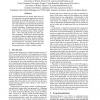Free Online Productivity Tools
i2Speak
i2Symbol
i2OCR
iTex2Img
iWeb2Print
iWeb2Shot
i2Type
iPdf2Split
iPdf2Merge
i2Bopomofo
i2Arabic
i2Style
i2Image
i2PDF
iLatex2Rtf
Sci2ools
ILP
2003
Springer
2003
Springer
Comparative Evaluation of Approaches to Propositionalization
Propositionalization has already been shown to be a particularly promising approach for robustly and effectively handling relational data sets for knowledge discovery. In this paper, we compare up-to-date methods for propositionalization from two main groups: logic-oriented and databaseoriented techniques. Experiments using several learning tasks - both ILP benchmarks and tasks from recent international data mining competitions - show that both groups have their specific advantages. While logic-oriented methods can handle complex background knowledge and provide expressive first-order models, databaseoriented methods can be more efficient especially on larger data sets. Accuracies gained vary such that a combination of the features produced by both groups seems a further valuable venture.
Related Content
| Added | 07 Jul 2010 |
| Updated | 07 Jul 2010 |
| Type | Conference |
| Year | 2003 |
| Where | ILP |
| Authors | Mark-A. Krogel, Simon Rawles, Filip Zelezný, Peter A. Flach, Nada Lavrac, Stefan Wrobel |
Comments (0)

